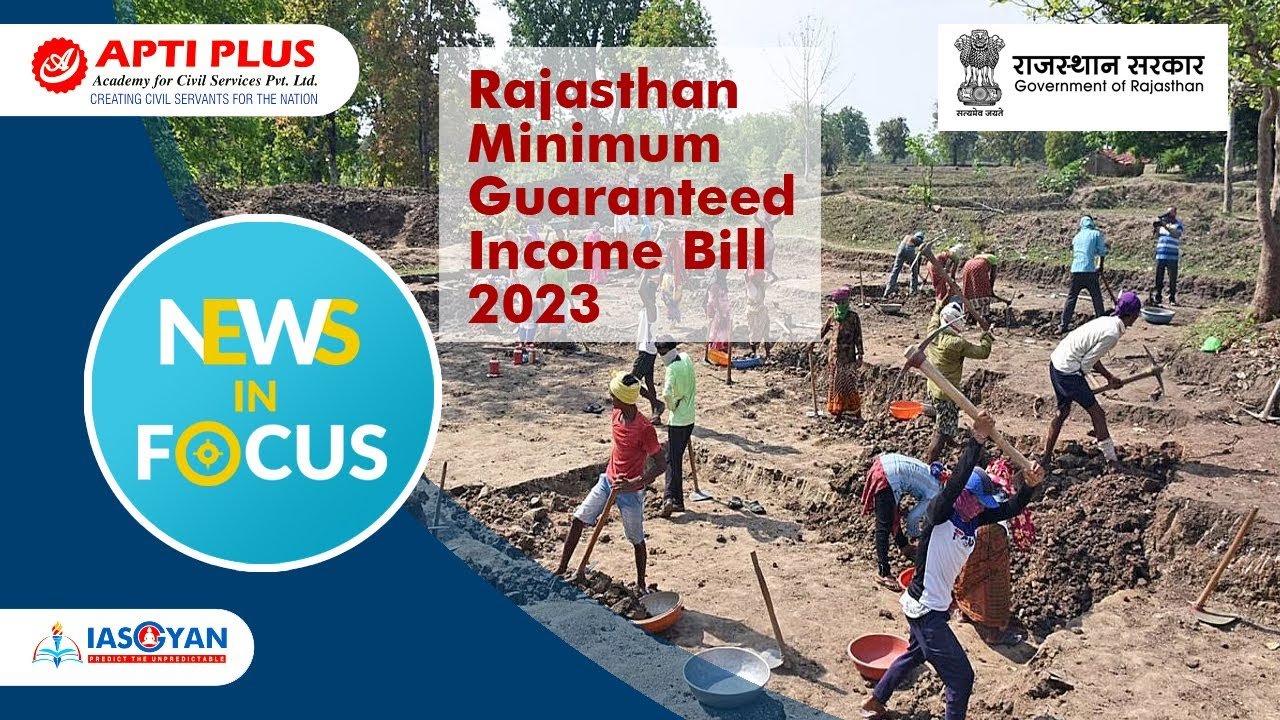Description

Copyright infringement not intended
Context: A new bill that aims to provide a minimum income guarantee to all adults in Rajasthan was introduced in the state assembly. The Rajasthan Minimum Guaranteed Income Bill, 2023, proposes to pay a monthly amount to every eligible person who is not earning a regular wage or receiving a pension. The bill also outlines the criteria for eligibility, the sources of funding, and the mechanism for implementation of the scheme.
Details
- The Rajasthan Minimum Guaranteed Income Bill 2023 is a landmark legislation that aims to ensure economic security and dignity for all citizens of the state. The Bill proposes to provide a minimum income guarantee and social security pensions to every adult resident of Rajasthan.
Salient features of the Bill
Minimum Guaranteed Income
- The state government will ensure that every adult citizen receives a minimum income of 125 days a year. This income will be delivered through the Indira Gandhi Shahri Rozgar Guarantee Yojana (IGSRGY) in urban areas and the Mahatma Gandhi National Rural Employment Guarantee Act (MGNREGA) in rural areas. The IGSRGY is a new scheme launched by the Rajasthan government to provide urban employment opportunities and skill development.
Guaranteed Employment
- The state government will also guarantee employment for 125 days a year to every household in the state. This will be done by enhancing the existing MGNREGA scheme in rural areas and adding 25 more days of work. The state will also provide additional funds and resources to implement the employment guarantee schemes effectively.
Guaranteed Social Security Pension
- The state government will also ensure that eligible individuals who are old, specially-abled, widowed, or single women receive a minimum pension of Rs 1,000 per month. This pension amount will be indexed to inflation and will increase by 5% in July and 10% in January of every financial year starting from 2024-2025.

Significance of this Bill
Poverty Alleviation
- One of the main objectives of the Bill is to address poverty by ensuring that every adult citizen receives a minimum income of Rs. 1,000 per month, which can be increased by the state government from time to time. This can help vulnerable families and individuals cope with economic hardship and meet their basic needs.
Social Security
- Another important aspect of the Bill is that it provides a minimum pension to the aged, specially-abled, widows, and single women, who often face financial insecurity and social exclusion. This can ensure their dignity and well-being in their old age or case of disability or loss of a spouse.
Employment Generation
- The Bill also guarantees 125 days of employment per year to every rural household, which is more than the existing 100 days under the Mahatma Gandhi National Rural Employment Guarantee Act (MGNREGA). This can provide more work opportunities and income to rural families, especially during lean seasons or in times of distress.
Social Welfare Focus
- The Bill reflects the government's commitment to prioritize the welfare of the most vulnerable sections of society, in line with Mahatma Gandhi's message of caring for the last person in the queue. The Bill also aims to promote social justice and equality by reducing income disparities and ensuring universal coverage.
Potential challenges that need to be addressed
Financial Burden
- The state government estimates that the scheme will cost an additional Rs 2,500 crore per year, which may increase the fiscal deficit and debt of the state. Moreover, the demand for guaranteed income and pensions may rise in the future, as the population grows and the economy faces shocks due to climate change, pandemics, or other factors.
Administrative Implementation
- The scheme requires a robust administrative system to ensure that the beneficiaries are correctly identified, verified, and enrolled. It also requires timely and transparent delivery of payments, as well as effective monitoring and evaluation of guaranteed employment projects. The state government will have to coordinate with various departments, agencies, and banks to implement the scheme smoothly and efficiently.
Disincentive to Work
- The scheme may create a disincentive to work among some beneficiaries, who may prefer to rely on the guaranteed income rather than seek employment or skill development opportunities. This may reduce the labour supply, productivity and economic growth, as well as increase the dependency ratio and fiscal burden. Moreover, some critics argue that work is not only a source of income, but also of dignity, meaning and social integration, and that UBI may undermine these values.
Steps to ensure Success Implementation of the scheme
Financial Planning
- The government should carefully plan and allocate resources to sustain the scheme's financial viability in the long run. It should also explore alternative sources of revenue, such as taxes, cesses or bonds, to fund the scheme.
Transparent Administration
- Transparent and efficient administration is crucial for smooth implementation. Proper monitoring and evaluation mechanisms should be in place to ensure accountability. The use of digital platforms, such as Aadhaar, bank accounts and mobile phones, can help in reducing errors and fraud.
Public Awareness
- Raising awareness about the scheme's benefits and eligibility criteria among the public is essential to ensure maximum participation and reach. The government should conduct extensive campaigns and outreach programs to inform and educate potential beneficiaries and stakeholders about the scheme.
Social Impact Assessment
- Conducting periodic social impact assessments will help measure the effectiveness of the scheme in reducing poverty and improving the well-being of vulnerable populations. The government should collect and analyze data on various indicators, such as income, consumption, health, education, empowerment and social cohesion, to evaluate the outcomes and impacts of the scheme

Conclusion
- the Rajasthan Minimum Guaranteed Income Bill 2023, represents a significant step towards providing economic security and social welfare to the entire adult population of the state. However, its successful implementation will require careful financial planning, administrative efficiency, and ongoing evaluation to achieve its intended impact on poverty alleviation and social well-being.
|
PRACTICE QUESTION
Q. What are the key features of the Rajasthan Minimum Guaranteed Income Bill, 2023, and what significance does it hold in addressing poverty and social welfare in the state? What challenges may the implementation of this Bill's face, and what steps can be taken as a way forward to ensure its successful and sustainable impact on the lives of citizens?
|
https://indianexpress.com/article/explained/rajasthan-minimum-income-bill-provisions-what-makes-it-unique-8849170/








